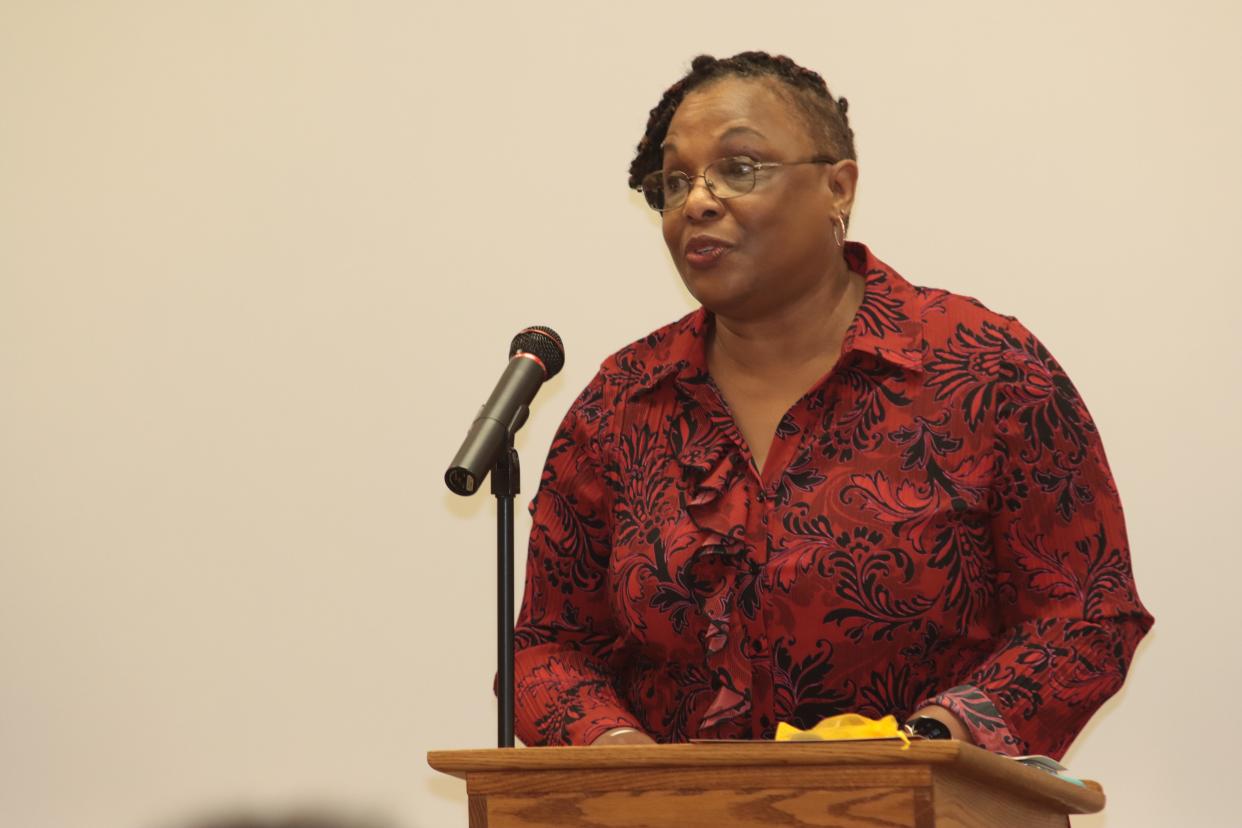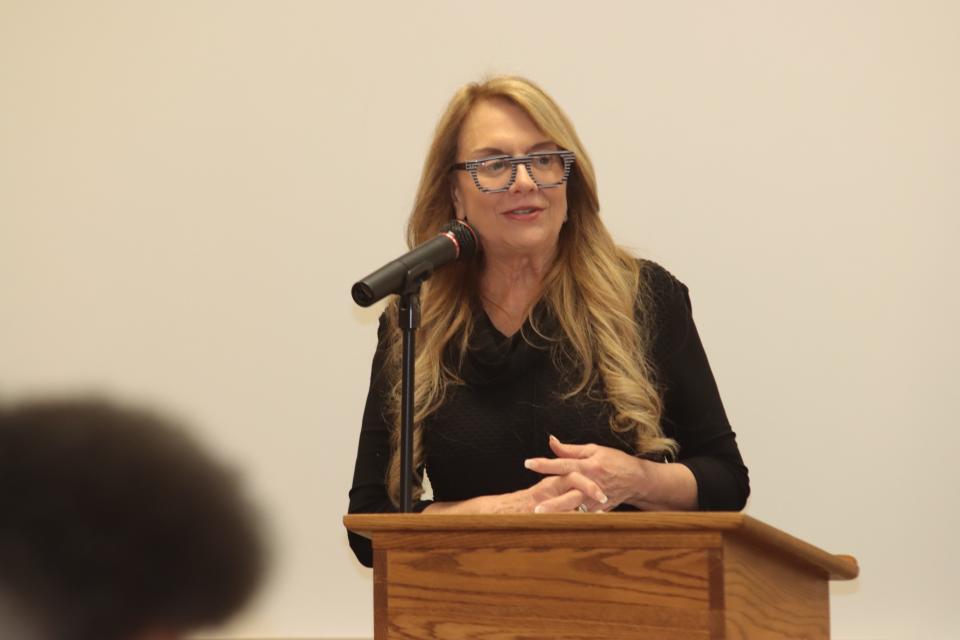Martin Luther King Jr., Civil Rights Movement remembered at breakfast in Tecumseh

- Oops!Something went wrong.Please try again later.
- Oops!Something went wrong.Please try again later.
TECUMSEH — Martin Luther King Jr.’s life and legacy were remembered Monday at a breakfast hosted by the Tecumseh First Presbyterian Church.
“He affected all of our lives, even though a lot of us weren’t around in the ’60s,” Jeanette Henagan, president of the Lenawee County chapter of the NAACP, said. “He continues to affect our lives.”
Henagan and Cynthia Gray of Adrian, the author of “Locusts in the Sandbox,” a book based on the 1963 bombing of the 16th Street Baptist Church in Birmingham, Alabama, by the Ku Klux Klan that killed four girls, were the featured speakers.
Henagan shared some facts about the famed civil rights leader:
• Martin was not his birth name. It was Michael. Henagan said his father, Martin Luther King Sr., changed his and his son’s names to honor the Reformation leader Martin Luther after visiting Germany and being influenced by Luther’s work. Martin Luther King Jr. was 5 years old then.
• King skipped two grades in high school and started at Morehouse College when he was 15. His divinity degree is from Crozer Theological Seminary, and his doctorate in theology is from Boston University.
• At the time he was awarded the Nobel Peace Prize in 1964, he was the youngest laureate. The youngest now is Malala Yousafzai, who was 17 when she was awarded the Peace Prize in 2014.
• He was arrested 29 times doing civil rights work and was under surveillance by the FBI.
• His mother was shot to death while sitting at their church’s organ. The assailant was after King’s father.
• He is the only non-president to have a national holiday and a monument on the National Mall in Washington.
• King first gave a version of his “I Have a Dream” speech on June 23, 1963, in Detroit at the conclusion of the Walk to Freedom down Woodward Avenue to Cobo Hall. He gave the full version at the March on Washington for Jobs and Freedom on Aug. 28, 1963.
Henagan said a march to mark the 60th anniversary of the Walk to Freedom will take place June 24 in Detroit.
• The title of King’s last book was “Where Do We Go from Here: Chaos or Community.”
“In that book he expressed his hope for change in the United States,” Henagan said. “But because of the continued, since his death, discrimination, continued racism in America, the answer to his question is chaos.”
She said King wanted us to work together.
“It's very important for all of us here … all of us right-minded people who knows what it means to love and knows what equality is, it is up to us to carry out and answer that question for him. He believed in equality. He believed in community. This is community, what’s going on here,” Henagan said.

Gray asked what kind of country would the United States be if King, rather than advocating nonviolent resistance, had used his charisma and speaking ability to advocate a different approach.
“Had he turned the cheek the other way and said, ‘Yes, let’s show them we mean business. Let’s do this, do that,’ I think we would have been a bloodbath that would have affected our history in ways we can’t even imagine,” Gray said. “The fact that this man was placed at that time in the Civil Rights Movement to bring people together, to uplift people, is absolutely something I don’t think we’ll ever see repeated in out lifetimes, unfortunately.”
In this 39 years, King changed the trajectory of politics and civil justice, Gray said. She credited his wife, Coretta Scott King, with also being part of the movement.
“They were built on faith, they were built on vision, they knew who they were, what needed to be done,” Gray said. “She picked up his legacy, all of his unfinished business, she strapped it to her back and she went out there 39 more years and fought for rights for everybody. I think there should be a Coretta King Day.”
Gray also credited King’s granddaughter, Yolanda, who last year at the age of 14, said the King holiday should not be a day off but a “day on” as a day of service.
“She went on to say, ‘Instead of idolizing my grandfather, pick a service project and do something to help the community,’” Gray said. She said it spoke of the legacy the King family continues to carry on.
Considering that King’s writings, speeches and sermons continue to inspire and educate people, Gray said that King is needed today. She said the person who has come the closest to King’s leadership is John Lewis, who marched with King and later served in Congress.
Gray listed three qualities that drew her to King: he was a servant, a believer and an encourager.
Gray also discussed events from the Civil Rights Movement that led her to write her book, including the Children’s Crusade on May 2, 1963, in Birmingham, when thousands of school children marched in the city and were arrested and, when more gathered the next day, were attacked by police. Gray said the media attention led to outrage and propelled support for the Civil Rights Act and the Voting Rights Act.
Gray said a history teacher she had in high school in Fort Wayne, Indiana, who came from Alabama taught her about what really happened in the South.
“She taught us things that I had no idea, because we did not know anything up north. We really didn’t,” she said. “They kept their dirty secrets so well hidden.”
Gray said it is important to remember the names of the four girls who were killed in the church bombing: Addie Mae Collins, Carol Denise McNair, Carole Rosamond Robertson and Cynthia Dionne Wesley. McNair was 11; the others were 14.
That only 22 others were wounded in the bombing is a miracle, she said.
King officiated at the funeral for three of the girls — one family buried their daughter quickly. Gray said she could not understand how he was able to calm the community and not give in to the intense emotions they must have felt.
Law enforcement did not put much effort into investigating the bombing, she said. It took 38 years to arrest and convict all of the perpetrators, and one died of cancer before he could be brought to justice.
Gray said she wrote her book to help people understand what happened then. She said she is working on a sequel to her book, which will follow the characters as they advance through the Civil Rights Movement.
This article originally appeared on The Daily Telegram: MLK, Civil Rights Movement remembered at breakfast in Tecumseh

